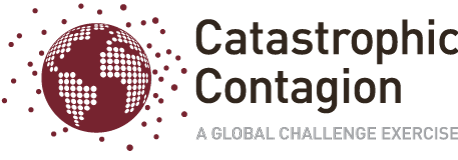
Participants
This training tabletop exercise is based on a fictional scenario. The inputs experts used for modeling the potential impact were fictional. It is a teaching and training resource for public health and government officials.
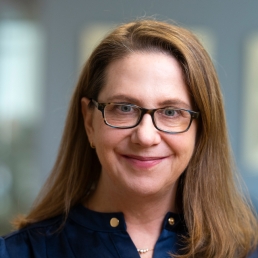
Anita Cicero
Ms. Cicero helps to lead strategic planning, program development, and health security policy development at the Center for Health Security at Johns Hopkins. She is the Associate Editor of the journal Health Security and has worked to improve mutual understanding of health security issues with multiple countries over the course of her career. She serves as Chair of a WHO Working Group on Dual Use Research of Concern, and she chairs a WHO Working Group tasked with developing recommendations for a governance framework for advanced life science research.
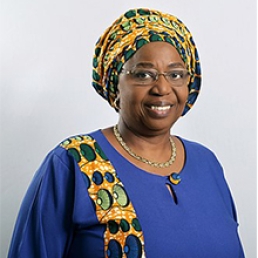
Awa Marie Coll Seck
Awa Marie Coll Seck, MD, PhD, is an infectious disease and bacteriology-virology specialist. She currently serves as Minister of State to the President of the Republic of Senegal and chairs the National Committee of the Extractive Industries Transparency Initiative (CN-ITIE), while also President of the Association Galien Africa (AGA). Professor Coll Seck has twice been Minister of Health in Senegal, and was named “Best Minister in the World” in Dubai in February 2017 at the World Government Summit. Professor Coll Seck had the responsibility of directing the Department of Infectious Diseases at Cheikh Anta Diop University in Dakar, Senegal. Prof and was Executive Director of the Roll Back Malaria Partnership (RBM) from 2004 to 2012 and Director of the Department of Policy, Strategy and Research of UNAIDS (1996-2001). She is on the Board of Directors of: Resolve to Save Lives, AFRIVAC, GAVI-the Vaccine Alliance, Grand Challenges Canada, Exemplars in Global Health, Extractive Industries Transparency Initiative (EITI). Professor Coll Seck is a member of the Jury of the ISA Prize for Services to Humanity (Bahrain), of the Noguchi Africa Prize (Japan) and of the Virchow Prize (Germany). She is also a member of the Advisory Board of the Harvard Ministerial Leadership Program (USA) and of steering committee of the ANRS | Emerging infectious diseases (France). She has received numerous honors, including Chevalier de l'Ordre du Mérite of Senegal, Burkina Faso and Gambia, as well as the the Palmes académiques, Ordre du Mérite and the Légion d’Honneur of France. She has also received the Japan Merit Certificate. Professor Coll Seck is the author of more than 150 scientific publications.
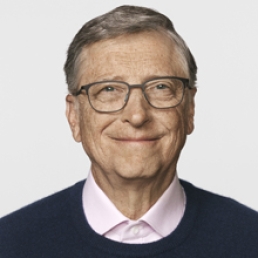
Bill Gates
Bill Gates is cochair of the Bill & Melinda Gates Foundation and founder of Breakthrough Energy. Bill founded Microsoft in 1975 with his childhood friend Paul Allen and led the company to become the worldwide leader in business and personal software and services. In 2008, Bill transitioned to focus full-time on the Gates Foundation’s work to expand opportunity to the world’s most disadvantaged people. As cochair, he shapes and approves foundation strategies and sets the overall direction of the organization. Through the foundation, he has spent more than 20 years working on global health and development issues including pandemic prevention; disease eradication; maternal, newborn and child health; agricultural development and water, sanitation and hygiene, among others. Through his private office, Gates Ventures, he pursues his work in Alzheimer’s research and other healthcare issues, interdisciplinary education, and technology. At Breakthrough Energy, he’s putting his experience as an innovator and problem-solver to work to address climate change by supporting the next generation of entrepreneurs, big thinkers, and clean technologies. In 2010, Bill, Melinda French Gates, and Warren Buffett founded the Giving Pledge, an effort to encourage the wealthiest families and individuals to publicly commit more than half of their wealth to philanthropic causes and charitable organizations during their lifetime or in their will.
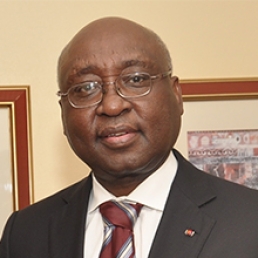
Donald Kaberuka
A Rwandan economist and former Finance Minister, Dr. Kaberuka is the 7th President of the African Development Bank (2005-2015). He is credited for expanding the reach and impact of AfDB, Africa’s premier financial institution during his two terms as President. Kaberuka is currently the African Union High Representative for Financing, the Peace Fund and COVID19 response. He is a member of the Board of Trustees of several organisations and think tanks including the Rockefeller Foundation, Center for Global Development, the Mo Ibrahim Foundation, The Brookings Institution and the London School of Economics. He serves on the International Advisory Council of Standard Chartered Bank and Co-Chair of Council on State Fragility. He was also nominated in 2017 to Chair the panel on the third External Evaluation of the International Monetary Fund. Since retiring from the African Development Bank, he is Chairman and Managing Partner of SouthBridge a financial and investment advisory firm which he co-founded. He was elected in 2019 as Chair of the Board of The Global Fund to Fight HIV/AIDS, TB and Malaria.
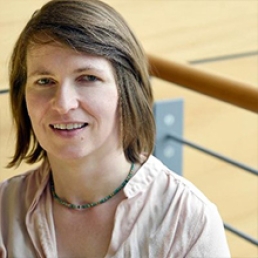
Johanna Hanefeld
Johanna Hanefeld leads the Centre for International Health Protection coordinating the international work of at the Robert Koch - Institute in Berlin - Germany‘s National Public Health Institute. She is also Prof for Global Health Policy at the London School of Hygiene and Tropical Medicine where her work has focused on policy and systems analysis.
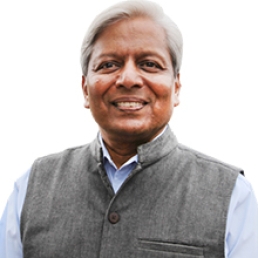
K. VijayRaghavan
Krishnaswamy VijayRaghavan is the Department of Atomic Energy Homi Bhabha Chair Professor and former director of the National Centre for Biological Sciences, Tata Institute of Fundamental Research. From April 2018- April 2022 he served as the Principal Scientific Advisor to the the Government of India. Prior to that, from 2013- 2018, he was Secretary to the Department of Biotechnology, Government of India. His research interests are in the fields of developmental biology, genetics and neurogenetics, on the principles and mechanisms that control the nervous system and muscles during development, and how these neuromuscular systems direct specific locomotor behaviours. In addition to continuing his laboratory’s research interests, Dr. VijayRaghavan is currently involved studying how sustainable development can be enabled in the context of climate change, global health challenges and the energy crisis. In this context, his focus is on how the university system in India can be empowered to these tasks task, and how collaboration in research that addresses these issues can be enhanced. Dr. VijayRaghavan is a Fellow of the Indian Science Academies. In 2012, he was elected a fellow of The Royal Society and was conferred upon the Padma Shri in 2013 by the Government of India. He is a foreign member of the US National Academy of Sciences and a foreign member of the American Philosophical Society.
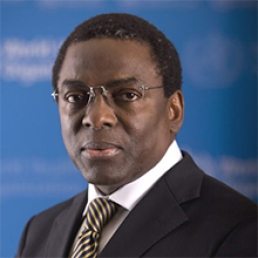
Luis Gomes Sambo
Luis Gomes Sambo: Medical Doctor, Specialist in Public Health and PhD on Management (Systems Science); with 45 years of working experience at local, national and international levels. Has served Angola as: District Medical Officer, Provincial Health Director, Vice Minister of Health, Secretary of State of Health and Minister of Health. Through 25 years as a staff-member of the World Health Organization Luis Sambo held the posts of WHO Country Representative, Head of the Technical Unit in charge of Health for All and Primary Health Care, Director of the Division in charge of Health Systems and Services Development, Director of Programme Management (1997-2005) and elected Regional Director of WHO for Africa (2005-2015). He is currently Honorary Professor at the Faculty of Business, Law and Politics of the University of Hull, UK; Research Fellow at the Global Health and Tropical Medicine, IHTM/Universidade Nova de Lisboa; member of the Recognition Committee of the World Federation of Medical Education; member of the Systems Thinking Expert Group of the Alliance for Health Policy and Systems Research hosted by WHO; and member of the Global Partnership for Maternal, Newborn & Child Health hosted by WHO. He holds titles of Litterarum Doctor Honoris Causa by the University of Hull, UK; Doctor Honoris Causa by the University Nova de Lisboa, Portugal; and Doctor Honoris Causa by the University of Kinshasa, Democratic Republic of Congo. He is affiliated to health-related professional, academic and research institutions; and author or co-author of more than 50 scientific publications including articles and book chapters. Fields of expertise: public health, and health systems management, training and research.
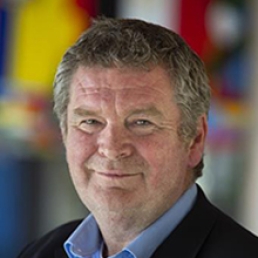
Mike Ryan
Dr. Mike Ryan serves as the Executive Director of the WHO Health Emergencies Programme. Dr. Ryan has been at the forefront of managing acute risks to global health for nearly 25 years. He is a founding member of the Global Outbreak Alert and Response Network, aiding response to hundreds of global disease outbreaks. Since joining the WHO in 1996, Dr. Ryan served as Coordinator of Epidemic Response; Operational Coordinator of WHO’s response to the SARS outbreak; WHO’s Director of Global Alert and Response, and most recently as Assistant Director-General for Emergency Preparedness and Response in WHO's Health Emergencies Programme.
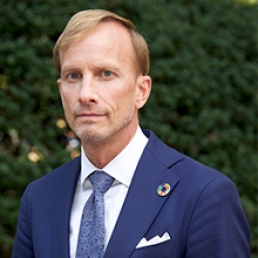
Mark Dybul
The Honorable Mark Dybul, MD, is a Professor in the Department of Medicine at Georgetown University Medical Center, and CEO of Enochian BioSciences. Mark has worked on HIV and public health for more than 25 years as a clinician, scientist, teacher, and administrator, most recently as the Executive Director of the Global Fund to Fight AIDS, Tuberculosis and Malaria. After graduating from Georgetown Medical School in Washington D.C., Mark joined the National Institute of Allergy and Infectious Diseases, as a research fellow under director Dr. Anthony Fauci, where he conducted basic and clinical studies on HIV virology, immunology and treatment optimization, including the first randomized, controlled trial with combination antiretroviral therapy in Africa. Mark was one of the founding architects in the formation of the U.S. President’s Emergency Plan for AIDS Relief, better known as PEPFAR. After serving as Chief Medical officer, Assistant, Deputy and Acting Director, he was appointed as its leader in 2006, becoming U.S. Global AIDS Coordinator, with the rank of Ambassador at the level of an Assistant Secretary of State. He served until early 2009. He also served as Executive Director of the Global Fund to Fight AIDS, Tuberculosis and Malaria from 2013 to 2017. Mark has written extensively in scientific and policy literature, and has received several Honorary Degrees and awards, and is a member of the National Academy of Medicine.
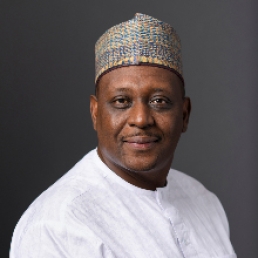
Muhammad Ali Pate
Dr. Muhammad Ali Pate is the Julio Frenk Professor of Public Health Leadership in the Department of Global Health and Population at the Harvard T.H Chan School of Public Health. He is co-Chair of the Initiative on the Future of Health and Economic Resilience in Africa (FHERA). Prior to joining the Harvard Chan School, Dr. Pate served as global director, health, nutrition and population (HNP) and director, global financing facility (GFF), with the World Bank Group in Washington, DC. Dr. Pate also served as a Richard L. and Ronay Menschel Senior Leadership Fellow at the Harvard T.H. Chan School of Public Health. Dr. Pate trained in the specialty of Internal Medicine at Howard University, Washington DC (1995-98) and sub-specialty of Infectious Diseases at the University of Rochester, Rochester NY (1998-2000). He received his Doctor of Medicine degree from Ahmadu Bello University, Nigeria, his Master of Science in health systems management from the London School of Hygiene and Tropic Medicine, and his Master of Business Administration with a certificate in health sector management from Duke University. Previously served as minister of state for health, Federal Republic of Nigeria, and prior to his time at the World Bank, he was chief executive officer of Big Win Philanthropy, an organization that invests in children and young adults in developing countries to improve their lives and maximize demographic dividends for long-term economic growth. Dr. Pate has taught many courses throughout his career, including “Leadership Development in Global Health: Trust and Community-based Leadership Networks in Global Health Practice” at the Harvard Chan School and comparative health systems to master’s degree students in global health at the Duke Global Health Institute, where he held an appointment as a visiting professor.
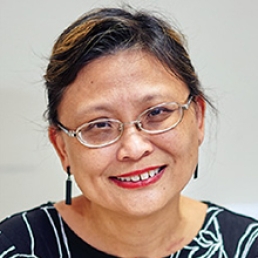
Poh Lian Lim
Poh Lian Lim: Associate Professor Lim is Chair of the Independent Allocation of Vaccines Group for the COVAX Facility, and Deputy Chair of the WHO Health Security Interface Technical Advisory Group (HSI-TAG). She served on the Global Outbreak Alert and Response Network (GOARN) Steering Committee, the Advisory Group on Reform of WHO's Work, and the UN Secretary General's Global Health Crises Taskforce. She moved from Seattle to Singapore in 2003, worked on the frontlines of the SARS outbreak, and wrote up the NEJM report on the first lab-acquired SARS case. Since then, she has worked extensively on outbreak preparedness and response for dengue, chikungunya, zika, MERS, COVID-19, pandemic and avian influenza, yellow fever, Ebola, and monkeypox, and is active in Singapore’s successful COVID-19 vaccine rollout.
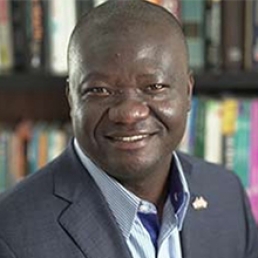
Tolbert Geewleh Nyenswah
Tolbert Nyenswah, LL.B., M.P.H., is a senior research associate with the Department of International Health at the Johns Hopkins Bloomberg School of Public Health. He is an internationally recognized legal scholar and a global public health expert. Prior to joining Johns Hopkins University, he was the deputy minister of health of Liberia, the director general/chief executive officer of the National Public Health Institute, and the assistant minister of health of the Republic of Liberia during the administration of President Ellen Johns Sirleaf, appointed by the president and confirmed by the senate three times. He specializes in health policies and systems and public health emergencies preparedness and response, advising on incident management system functionalities. He has been engaged with several public health emergencies, including as the incident manager of the 2014–2016 Ebola epidemic in West Africa, Lassa Fever, Zika, meningitis, and now COVID-19. Some of his major contributions to the COVID-19 response include developing a contact tracing course that has more than 15 million viewers, including 1.3 million enrolled and certified, adapted by all US 50 States. He has been interviewed by multiple African, North American, Asian, European, and South American media outlets, including The New York Times, The Washington Post, The Hill, Business Insider, Bloomberg, USA Today, NPR Radio, BBC, VOA News, World Economic Forum, The Philadelphia Inquirer, VOA Africa, The New Yorker, STAT, and Politico. Member of an expert committee that released a consensus report of The National Academies of Sciences, Engineering and Medicine, titled “Public Health Lessons for Non-Vaccine Influenza Interventions, Looking Past COVID-19.” He is also a member of the Global Health Security Index International panel of experts, which assesses the overall health security capacities of 195 nations based on a multitude of health indicators. Then Head, of Liberia Incident Management System Ebola Response, He joined Bill Gates, Peter Piot, and others; in 2015, Mr. Gates convened and chaired an Independent Expert Group (IEG) that discussed lessons learned from the Ebola crisis, following a proposal of the German G7 presidency. The IEG was tasked with developing recommendations for improving global preparedness for potential future epidemics that Chancellor Merkel forwarded to the G7. The IEG was composed of experts from global public health agencies, international non-governmental organizations, private sector companies, and national governments from the region affected by the Ebola outbreak. A strong policy memo emanated from the IEG on “preparing for the Next Epidemic – A Global Preparedness and Response System” …five years prior to COVID-19. He has received numerous awards, notably the Bloomberg Hopkins Emerging Leader, Outstanding Recent Graduate from the Johns Hopkins University Alumni Association, the Medal of Excellence for Public Health Services, the Medal from the Surgeon General of the United States, and the highest Liberian civilian award for leading the Ebola crisis. He has authored and co-authored numerous scientific publications and peer-reviewed several.
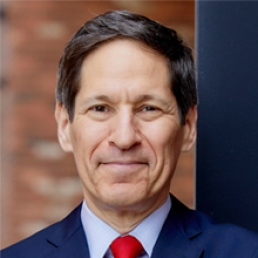
Tom Frieden
Dr. Tom Frieden is a physician trained in internal medicine, infectious diseases, public health, and epidemiology. He is former director of the US Centers for Disease Control and Prevention and former commissioner of the New York City Health Department. Dr. Frieden is currently President and CEO of Resolve to Save Lives. Dr. Frieden began his public health career in New York City confronting the largest outbreak of multi-drug resistant tuberculosis to occur in the US. He was then assigned to India, on loan from the Centers for Disease Control and Prevention, where he helped scale up a program for effective tuberculosis diagnosis, treatment, and monitoring. Asked to return to New York City to become Mayor Mike Bloomberg’s Health Commissioner, he directed efforts to reduce smoking and other leading causes of death that increased life expectancy by 3 years. As Director of the US Centers for Disease Control and Prevention, Dr. Frieden oversaw the work that helped end the 2014 West Africa Ebola epidemic. He now leads Resolve to Save Lives that works with countries to prevent 100 million deaths and to make the world safer from epidemics. During the Covid pandemic, Dr. Frieden has overseen an expansion of Resolve to Save Lives activities including policy and program innovations in the United States, counsel to multilateral institutions, and support for rapid response, health care worker safety, and data-driven decision-making in more than 20 countries. Dr. Frieden is also Senior Fellow for Global Health at the Council on Foreign Relations.
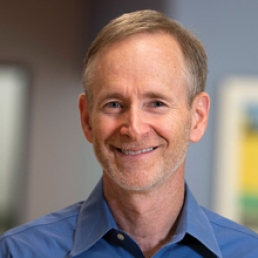
Tom Inglesby
Dr. Inglesby is the Director of the Johns Hopkins Center for Health Security at the Bloomberg School of Public Health, and also a Professor in the Department of Environmental Health and Engineering in the Johns Hopkins Bloomberg School of Public Health, with a Joint Appointment in the Johns Hopkins School of Medicine. Dr. Inglesby's work is internationally recognized in the fields of public health preparedness, pandemic and emerging infectious disease, and prevention of and response to biological threats. He was Chair of the Board of Scientific Counselors for the Center for Preparedness and Response at the US Centers for Disease Control and Prevention (CDC) from 2010 to 2019. He was also Chair of the National Advisory Council of the Robert Wood Johnson Foundation’s National Health Security Preparedness Index, and has served as advisor to US Department of Health and Human Services (HHS), US Department of Defense, and US Department of Homeland Security on preparedness and response issues. During the COVID-19 pandemic, Dr. Inglesby has provided technical guidance to response efforts at the global, federal, state, and local level. Dr. Inglesby served as Senior Advisor on the White House COVID-19 Response Team. In 2020, he served on the Biden-Harris transition team reviewing HHS and advising on COVID-19 policy. In 2021, Dr. Inglesby served as Senior Policy Advisor for the COVID-19 response in the Office of the U.S. Health and Human Services Secretary. Dr. Inglesby has authored or coauthored more than 170 publications, including peer-reviewed research, reports, and commentaries on issues related to health security, preparedness for epidemics, biological threats, and COVID-19.


